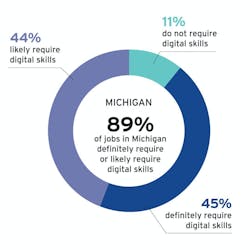On Jan. 24, The National Skills Coalition (NSC) issued a press release announcing new data that spotlights the demand for digital skills in Michigan’s labor market. NSC also addressed how Broadband Equity Access and Deployment (BEAD) funds can be used to invest in skill development programs.
NSC reported that 89% of jobs it analyzed require digital skills, including jobs in sectors like manufacturing, healthcare, and agriculture, all of which are priority sectors for the state. Combined with a previous NSC research report that found one-third of workers lack the foundational digital skills necessary to enter and succeed in the job market, this research points to a worker demand that Michigan’s workforce may not be able to meet.
Rachel Unruh, NSC chief of external affairs, believes this issue can be addressed with BEAD funds, saying in the press release, “This new research demonstrates the urgency—and the payoff—if Michigan directs a significant portion of BEAD resources to high-quality digital skills training programs. Digital skills bring the magic to connectivity and are essential to advancing equity, opportunity, and economic growth.”
Over the next few years, more than $1.5 billion will be directed to Michigan through the BEAD program to advance digital equity among populations most impacted by the digital divide, and NSC reports it will be working with policymakers, state coalitions, Comcast, and non-profit partners to encourage leaders to invest in skill development programs.
NSC argues that public investments to close this digital skill gap could generate measurable economic payoff. They report that, for workers, transitioning from a job that requires no digital skills to one that requires just one digital skill can yield a 23% wage increase, and for employers, providing workers with opportunities to gain digital skills can save businesses between $25,000 and $78,000 per employee in turnover and retention costs.
Marcus Keech, Grand Rapids Chamber director of government affairs, said, “Gaining a new digital skill is like turning on the electricity after a lifetime of burning candles. Our goal is to fuel the continued growth of our workforce by working together with policymakers, business leaders, and organizations like Comcast to address gaps and accelerate workforce potential—supporting digital skills education will help us do exactly that.”
Comcast has supported Michigan’s digital journey by investing more than $855 million in technology and network infrastructure in the last three years.
Comcast vice president of government & regulatory affairs, Craig D’agostini, said in the press release, “Digital skills training unleashes the potential of high-speed internet within homes and businesses. We’re proud to be a partner in Michigan’s digital equity journey and to continue to work with policymakers and community leaders to close the digital divide. Together, we can ensure the success of Michigan’s workforce, today and tomorrow.”
For more news, products, and technical profiles in broadband cable and telecommunications technology, subscribe to BTR's newsletter and follow us on LinkedIn, Twitter, and Facebook.






